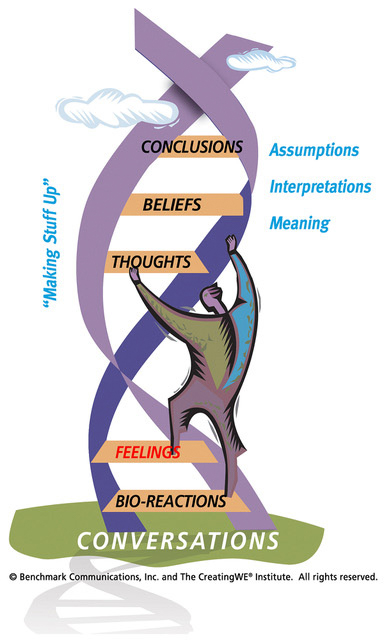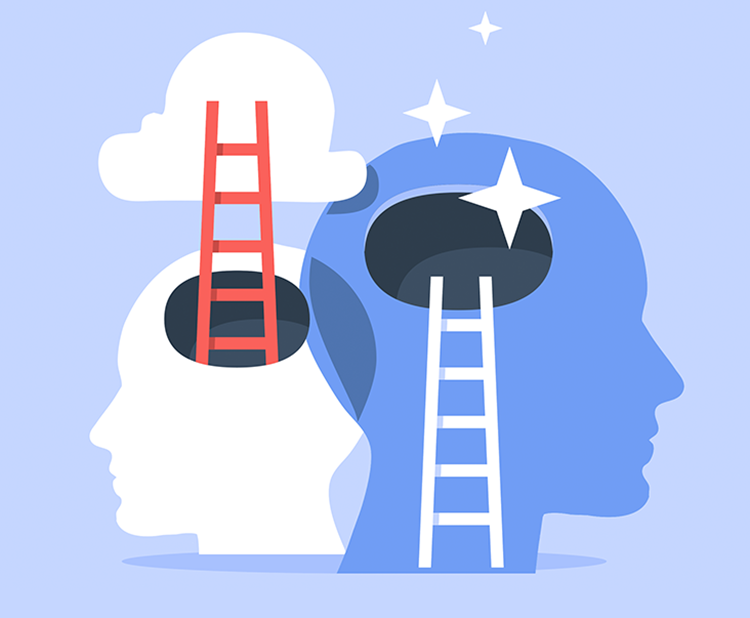By Nicklas Balboa
Published in: Personal Excellence presented by HR.com
Why is self-awareness one of the most sought after leadership skills? During times of intense difficulty, when important decisions must be made, self-awareness can be the difference between sinking or swimming.
Difficult decisions stir our emotions. It is part of what makes us human. In the heat of the moment, the brain boosts the production of hormones and neurotransmitters that drive our current state of mind. We then translate those ‘good or bad’ inner experiences into words, sentences, and stories. At this stage, we’ve begun the climb up the Ladder of Conclusions (Fig. 1). Our “story” puts words to the drama of the experience, contributing to the formulation of our beliefs. Once we’ve interpreted the meaning of our “story”, we arrive at a set of conclusions. By climbing up the ladder we crystallize our position, and close off the influence of other sources of vital information.
 Figure 1. The Ladder of Conclusions is a creation of Judith E. Glaser, inventor of Conversational Intelligence. Graphics by Roxanne Panero, The CreatingWE Institute.
Figure 1. The Ladder of Conclusions is a creation of Judith E. Glaser, inventor of Conversational Intelligence. Graphics by Roxanne Panero, The CreatingWE Institute. For example, when I began my career as a researcher in Conversational Intelligence, I studied the effects that certain biochemicals, such as cortisol & oxytocin, have on behavior. In piecing together the biological bits and bolts of everyday conversations, I felt that I had a strong understanding of what influences our ability to connect through language. Ambitiously, I concluded that I myself was conversationally intelligent. It came as a surprise when my boss Judith E. Glaser, creator of Conversational Intelligence, told me that I had a lot to learn in order to master conversations. “Nick, you know a lot about how people work, but what’s more important is how you work with them. There’s an art within the science,” she said. Wise words that I carry with me today. Rather than being open to other people, their perspectives and data, I found myself constantly arguing to defend my position. Meanwhile our business was expanding, and the demand for interpersonal skills was on the rise. I found myself at a career cross-roads: I could no longer operate from behind the scenes, and needed to work one-on-one with clients to help them successfully navigate our product platform. I felt fear, panic, and uncertainty, but I remembered that when you find yourself at the top of the ladder, the only place you can go is back down.
When we gather evidence to defend what we know, we operate like an ostrich with its head in the sand, only aware of the small world around us. Our beliefs influence what we observe, and dictate the data we select to base our decisions on. It takes true courage and self-awareness to shine a light on our own assumptions, and climb down the ladder of conclusions. By breaking this reflexive loop, we open our minds to the influences of new people, and new sources of information. When it comes to making important decisions, remember this: once you accept the fact that you can be wrong, you make better decisions.
References
Conversational Intelligence (The Book)
Promoting Trust in Everyday Conversations
Nicklas Balboa is a researcher and Project Manager at The CreatingWE Institute. Since joining The Institute in 2017, Nicklas worked alongside founders Judith E. Glaser & Richard D. Glaser on a myriad of Conversational Intelligence (C-IQ) projects. Nicklas is the Manager of the Institute’s Catalyst Tools and curated the WE-IQ TV Neuroscientist Interviews. He authors a blog on The Neuroscience of Conversations for Psychology Today. Key research interests include cognitive and brain sciences as they relate to interpersonal relationships.









